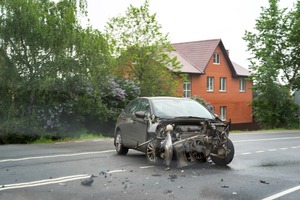
What to Do Immediately After the Accident
Immediately following an accident, right while you’re at the scene, it’s important to:
Stay Calm and Stay Safe
Take a deep breath and assess your surroundings. If possible, move your vehicle to a safe location, such as the shoulder of the road or a nearby parking lot, to avoid further danger. Do not try to chase the fleeing driver, as this can put you at even greater risk. Instead, focus on gathering information and ensuring your own safety.
Call 911
Report the accident to the police right away. Let them know that the driver fled the scene and provide any details you remember about the vehicle, such as the make, model, color, or license plate number. A police report is essential for insurance claims and any legal action you may take. Officers may also be able to locate the driver using nearby traffic cameras or witness statements.
Seek Medical Help
Even if you don’t feel hurt immediately, you should get checked out by medical professionals. Some injuries, such as concussions, internal bleeding, or whiplash, may not show symptoms right away but can become serious if left untreated. Paramedics can assess your condition at the scene, and a doctor can provide a full evaluation to document any injuries for your claim.
Gather Evidence
If you are physically able, take photos of the accident scene, including your vehicle, any visible injuries, and surrounding details such as skid marks, debris, or damage to other property. This evidence can be crucial when filing an insurance claim or pursuing legal action. If there are any traffic cameras nearby, make a note of their locations in case they captured the accident.
Talk to Witnesses
If anyone saw the accident, ask for their names and contact information. Witnesses can provide statements that may help law enforcement identify the fleeing driver. Their testimony can also support your case when dealing with insurance companies.
Write Down What You Remember
As soon as possible, write down everything you remember about the accident. Include the time, location, weather conditions, and any details about the other vehicle. The more information you can provide, the better your chances of identifying the driver and securing compensation for your damages.
What to Do in the Days After the Accident
In the days following the incident, you’ll want to:
Follow Up with a Doctor
Some injuries take time to develop, so it’s important to monitor your condition and follow your doctor’s recommendations. Keep track of all medical visits, prescriptions, and treatments, as this documentation will be critical if you decide to pursue compensation.
Get a Copy of the Police Report
Request a copy of the police report as soon as it is available. The report may contain key details, such as witness statements or surveillance footage, that can help strengthen your case. If you notice any errors in the report, notify the police department to have them corrected.
Notify Your Insurance Company
Report the accident to your insurance provider as soon as possible. If you have uninsured motorist coverage, it may help cover your medical expenses and vehicle repairs. Be cautious when speaking to insurance representatives and stick to the facts—do not speculate about fault or downplay your injuries.
Look for Surveillance Footage
Check with local businesses, gas stations, or homes near the accident scene to see if they have security cameras that may have recorded the incident. Even if the police are handling the investigation, having additional footage can help identify the driver or provide evidence for your claim.
Stay Organized
Keep all documentation related to the accident in one place, including medical records, repair estimates, police reports, and any correspondence with insurance companies. This will help you stay on top of deadlines and provide the necessary evidence if you decide to take legal action.
Why You Should Contact an Attorney
Hit-and-run cases can be complicated, and insurance companies may try to minimize your claim. Even if your injuries seem minor, you should speak with an attorney to protect your rights. A lawyer can help you gather evidence, negotiate with insurance companies, and explore all possible sources of compensation, including uninsured motorist coverage. They can also handle legal paperwork and ensure you meet all filing deadlines.
If you were injured in a hit-and-run accident, you don’t have to navigate this process alone. The experienced attorneys at ShugarmanMehring are here to help. We will fight to get you the compensation you deserve and guide you through every step of the legal process. Contact us today for a free consultation to discuss your options.

